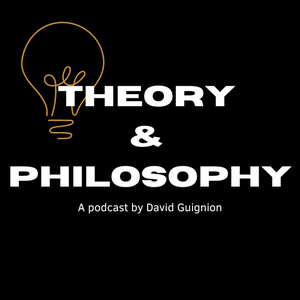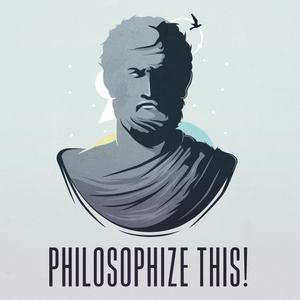
The Nietzsche Podcast
Untimely Reflections
A podcast about Nietzsche's ideas, his influences, and those he influenced. Philosophy and cultural commentary through a Nietzschean lens. Support the show at Patreon: https://www.patreon.com/untimelyreflections A few collected essays and thoughts: https://untimely-reflections.blogspot.com/
- 1 hour 34 minutesUntimely Reflections #32: Dr. Gregory Sadler - On Stoicism & Philosophy as a Guide to Life
Very pleased to finally be joined by Gregory Sadler on the podcast! Greg is one of the more popular teachers of philosophy in the modern age, and given his recent courses on Stoicism, we decided to make that the focus. I hope you all enjoy our conversation: about philosophy as a guide to life, Stoicism versus Epicureanism, distortions of Stoicism and Nietzsche, whether philosophy is self-help, and the relevance of Stoicism to modern life.
Sadler's Lectures on Spotify: https://open.spotify.com/show/0lGAsuWNmAfVKL4KDLDO6v
Greg's Youtube Channel: https://www.youtube.com/channel/UCEtxsMx4qsoitFwjBdLU_gA
21 January 2025, 3:05 pm - 1 hour 23 minutes107: Søren Kierkegaard - Fear & Trembling
Among the 19th century forerunners of existentialism are Friedrich Nietzsche and Søren Kierkegaard. While there is much that divides these two thinkers - one is atheist and the other a Christian, one seeks faith in Fate and the other in God - there are some curious similarities between these two great minds. Kierkegaard is a Christian against Christianity, critiquing the easy optimism or sordid resignation that passed for the Christian faith during his time. Kierkegaard was driven by a desire to become a missionary within Christendom, to make everything harder, and push the ordinary Christian to see faith a paradoxical struggle. The Christian is called to live an absurd life, with impossible hopes, out of the knowledge that nothing is impossible with God. In this episode we discuss Kierkegaard's life, the background of his ideas during the first authorship, and the analysis of Abraham in Fear & Trembling.
14 January 2025, 2:17 pm - 1 hour 23 minutes106: Emil Cioran - On the Heights of Despair
Cioran is notorious as the depressive philosopher par excellence. While figures such as Schopenhauer, Ligotti and Benatar have advanced logical arguments for their pessimistic outlook, Cioran's work is completely missing any such justification for his depressive feeling for life. Instead, his work is a lyrical outpouring of his inner life. In this episode we're taking a look at his first and most infamous book, "On the Heights of Despair", written during a bout of insomnia. As his translator, Zarifopol-Johnston argues, the book was an attempt to preserve Cioran's real self by "killing" a literary version of himself. We explore this interpretation of Cioran's work: that it is a means of coping with the madness and sorrow he finds within himself, through lyricism. Ironically, a text that was rumored to have caused many suicides may have preserved Cioran's life.
7 January 2025, 2:00 pm - 1 hour 1 minuteLove Never Faileth (Redux)
This is a revision and re-recording of Episode 04 of the podcast, "Love Never Faileth". I felt that it wasn't my best work in terms of execution, but one of the best episode concepts. As a New Year's special, enjoy this redux of a classic episode. Some parts have been added, some have been removed, and overall I think the lecture flows better and better gets across the ideas I'd originally hoped to convey. We return to regular episodes of the podcast next week.
31 December 2024, 1:23 pm - 51 minutes 31 secondsAnti-Christmas Special
Is this an anti-Christian screed? Far from it. Today we take a deep dive into one of Nietzsche's core concepts from the Antichrist: the reversal of our understanding of the terms "soul" and "spirit". While many Christians do not even give much thought to the difference between these terms, this was, historically, a key distinction. Nietzsche's great subversion is in critiquing the spirit as a false world, and redefining the soul as a chaotic multiplicity. This radical attack culminates in a suspicion of not only all theology, but all philosophy, all dialectic. Merry Christmas!
24 December 2024, 1:33 pm - 1 hour 21 minutesThe Gay Science #9 (II.98-II.107)
Finishing book 2 of TGS! This coming Tuesday, a Wandering Above a Sea of Fog episode, then a break for a week. Episode art: Priestess at Delphi by John Collier
21 November 2024, 2:14 pm - 1 hour 43 minutesThe Gay Science #8 (II.84 - II.97)
Continuing with The Gay Science readthrough! More sections on art, the eternal war between prose and poetry, the Apollinian and Dionysian, and more. Episode art: The Human Condition by Rene Magritte.
14 November 2024, 2:31 pm - 2 hours 25 minutesQ&A #11
Patrons: "Have you ever said Yes to a single joy?"
Salts: "Yes"
12 November 2024, 2:21 pm - 1 hour 45 minutesThe Gay Science #7 (II.76-II.83)
"Many lies tell the poets" - Homer. Nietzschean exploration of art, of truth and appearance in the artistic world, the way that madness, art and ritual relate, and the translation of artistic expression into different cultural contexts. Join me for this continuation of our The Gay Science readthrough!
7 November 2024, 1:57 pm - 1 hour 53 minutesAll Hallow's Special - Robert Chambers' Repairer of Reputations, featuring Mynaa
In this episode, Mynaa and I discuss The Repairer of Reputations, the first story in Robert Chambers' collection, The King in Yellow. Concepts in Chambers work contributed to the creation of the 'weird fiction' genre, and remain influential on media today - including the King in Yellow, the notion of a book that can drive you mad, and names such as Carcossa and the Hyades. We've delved into the topic of madness quite thoroughly on the podcast recently, so it only seemed fitting to continue the discussion through to the Halloween episode. Our topics include a broader discussion of madness and society, the unreliable narration of the protagonist, how his delusional fantasies reflect his political madness, the "lethal chamber" and its meaning, and much more. HAPPY HALLOWEEN!
31 October 2024, 1:09 pm - 1 hour 38 minutes105: Arthur Machen - The Great God Pan
Samhain is fast approaching, and this week we're going to have two spooky episodes of the podcast. This episode will be a philosophical exploration of the significance of Arthur Machen's weird fiction/horror novella, "The Great God Pan". While I'd originally planned this for the second leg of the season, we're interrupting The Gay Science readthrough for the sake of the holiday, and because this story brings together many of the elements that we've discussed so far this season, namely: madness, the horror of science, the gulf between appearance and reality, and the Dionysian reaching out from ages past to disturb the modern world. Join me for a romp through the woods with our new friends Helen, and The Great God Pan!
29 October 2024, 1:22 pm - More Episodes? Get the App
Your feedback is valuable to us. Should you encounter any bugs, glitches, lack of functionality or other problems, please email us on [email protected] or join Moon.FM Telegram Group where you can talk directly to the dev team who are happy to answer any queries.
 Philosophy For Our Times
Philosophy For Our Times
 Academy of Ideas
Academy of Ideas
 Theory & Philosophy
Theory & Philosophy
 The Partially Examined Life Philosophy Podcast
The Partially Examined Life Philosophy Podcast
 History of Philosophy Without Any Gaps
History of Philosophy Without Any Gaps
 Philosophize This!
Philosophize This!